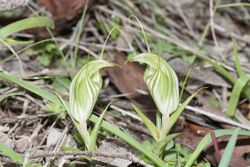Biology:Pterostylis robusta
| Sharp-leaf greenhood | |
|---|---|

| |
| Pterostylis robusta growing near Charlton | |
| Scientific classification | |
| Kingdom: | Plantae |
| Clade: | Tracheophytes |
| Clade: | Angiosperms |
| Clade: | Monocots |
| Order: | Asparagales |
| Family: | Orchidaceae |
| Subfamily: | Orchidoideae |
| Tribe: | Cranichideae |
| Genus: | Pterostylis |
| Species: | P. robusta
|
| Binomial name | |
| Pterostylis robusta R.S.Rogers[1]
| |
| Synonyms[2] | |
| |
Pterostylis robusta, commonly known as the sharp-leaf greenhood, is a species of orchid endemic to south-eastern Australia . As with similar orchids, the flowering plants differ from those which are not flowering. The non-flowering plants have a rosette of leaves but the flowering plants have a single flower with leaves on the flowering spike. This greenhood has a relatively large green, white and reddish-brown flower with reddish-brown stripes with the labellum just visible inside the flower.
Description
Pterostylis robusta is a terrestrial, perennial, deciduous, herb with an underground tuber and when not flowering, a rosette of four to ten, dark green, egg-shaped leaves. Each leaf is 10–25 mm long and 10–16 mm wide. Flowering plants have a single flower 27–35 mm long and 10–12 mm wide borne on a spike 50–200 mm high with three to seven spreading stem leaves. The flowers are green, white and brownish with a reddish-brown tinge or stripes. The dorsal sepal and petals are fused, forming a hood or "galea" over the column. The dorsal sepal curves forward with a sharp point 2–4 mm long. The lateral sepals are erect, held closely against the galea, have an erect, thread-like tip 20–30 mm long and a flat sinus with a small notch between their bases. The labellum is 12–15 mm long, 3–4 mm wide, dark brown or green and just visible inside the flower. Flowering occurs from April to August.[3][4][5][6]
Taxonomy and naming
Pterostylis robusta was first formally described in 1927 by Richard Sanders Rogers and the description was published Transactions and Proceedings of the Royal Society of South Australia.[1][7] The specific epithet (robusta) is a Latin word meaning "strong like oak" or "robust".[8]
Distribution and habitat
The sharp-leaf greenhood is most common in the higher rainfall areas of South Australia where it sometimes forms extensive colonies. In Victoria it grows in open forest in the north-west of the state but it is rare in New South Wales where it grows on sheltered ridges south from Wagga Wagga.[3][4][5][6]
References
- ↑ 1.0 1.1 "Pterostylis robusta". APNI. https://id.biodiversity.org.au/instance/apni/488643. Retrieved 25 May 2017.
- ↑ "Pterostylis robusta". World Checklist of Selected Plant Families (WCSP). Royal Botanic Gardens, Kew. http://wcsp.science.kew.org/namedetail.do?name_id=170639.
- ↑ 3.0 3.1 Jones, David L. (2006). A complete guide to native orchids of Australia including the island territories. Frenchs Forest, N.S.W.: New Holland. pp. 292–293. ISBN 978-1877069123.
- ↑ 4.0 4.1 Jeanes, Jeff. "Pterostylis robusta". Royal Botanic Gardens Victoria: vicflora. https://vicflora.rbg.vic.gov.au/flora/taxon/b58240f0-5b1d-4834-b353-f353d55cebd7. Retrieved 25 May 2017.
- ↑ 5.0 5.1 Jones, David L.. "Pterostylis robusta". Royal Botanic Garden Sydney: plantnet. http://plantnet.rbgsyd.nsw.gov.au/cgi-bin/NSWfl.pl?page=nswfl&lvl=sp&name=Pterostylis~robusta. Retrieved 25 May 2017.
- ↑ 6.0 6.1 "Pterostylis robusta". State Herbarium of South Australia: eflora SA. http://www.flora.sa.gov.au/cgi-bin/speciesfacts_display.cgi?form=speciesfacts&family=&genus=Pterostylis&species=robusta&iname=&submit=Display. Retrieved 25 May 2017.
- ↑ Rogers, Richard Sanders (1927). "Contribution to the Orchidology of Australia". Transactions and Proceedings of the Transactions and Proceedings of the Royal Society of South Australia 51: 296–297. https://www.biodiversitylibrary.org/item/129843#page/313/mode/1up. Retrieved 25 May 2017.
- ↑ Brown, Roland Wilbur (1956). The Composition of Scientific Words. Washington, D.C.: Smithsonian Institution Press. p. 556.
Wikidata ☰ Q15491928 entry
 |

